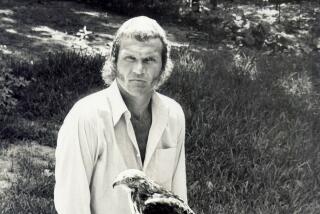The Fred Chappell Reader by Fred Chappell (St. Martin’s: $22.95; 491 pp.)
- Share via
For those not previously acquainted with Fred Chappell, this sampling may come as a bolt from the sky. Not since James Agee and Robert Penn Warren has a Southern writer displayed such masterful versatility. Together with only a handful of his American contemporaries, Chappell reminds us of the almost forgotten phrase “man of letters.” Since the publication of his first novel, “It Is Time, Lord,” in 1963, Chappell has written five novels, a book of short stories and 11 volumes of poetry, as well as essays, literary criticism and reviews. Born and reared just 20 miles from Asheville, N.C., the home and literary dominion of Thomas Wolfe, Chappell, now in his early 50s, has emerged from Wolfe’s giant shadow with his own distinct voice, a blend of elegant erudition and a kind of earthy, Appalachian folk wisdom.
This collection offers a panoramic view of Chappell’s range and depth. In addition to a generous selection from his short fiction--stories from both the rural and urban South--it contains fragments from four novels and the short novel, “Dagon”--arguably his best--in full. Here too is the best of Chappell’s verse, poetry for which he shared the prestigious Bollingen Prize with John Ashbery in 1985. Musical and intensely metaphorical in his fiction, Chappell has increasingly turned to poetry in recent years. Though he writes of love and sexual desire, of Rimbaud and the death of W. H. Auden, Chappell the poet seems most at home in his native Appalachia, his marriage of meter to mountain idiom recalling Frost’s monologues of laconic New Englanders. In “My Grandmother Washes Her Feet,” the young Chappell listens as his grandmother--soaking tired feet in a tub and telling him dark family secrets--cautions him: “. . . Nothing new gets started without the old’s/Plowed under, or halfway under. We sprouted from dirt/ Though, and it’s with you, and dirt you’ll never forget.”
Encountering Chappell’s fecundity, his startling versatility between two covers, no reader will doubt that the mountain boy grew up remembering that dirt. The tree of his talent took root in it. The tree bore good fruit.
More to Read
Sign up for our Book Club newsletter
Get the latest news, events and more from the Los Angeles Times Book Club, and help us get L.A. reading and talking.
You may occasionally receive promotional content from the Los Angeles Times.









